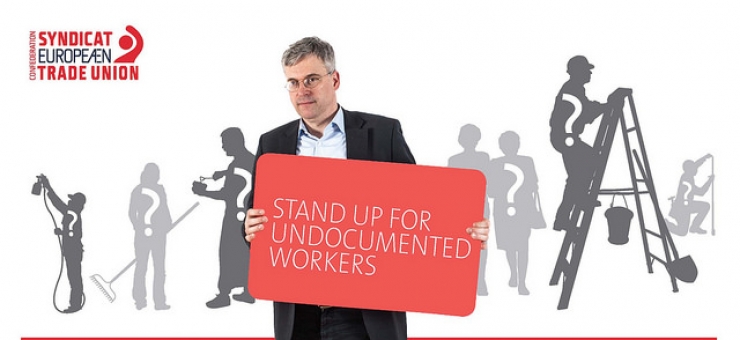Stand up for undocumented workers

Excluding undocumented workers from contributing to and benefiting from education and other public services costs EU citizens far more than including them, says a brochure published for the International Migrants Day (December 18) by the European Trade Union Confederation (ETUC) and Union MigrantNet.
Estimates for the number of undocumented migrants in the EU range from under 2 million to almost 4 million. It is unknown how many are in undeclared work. What is clear is that undocumented workers are
- prevented from contributing to the (income) tax, health care, pension and benefits systems;
- exploited by their employers who profit by deliberately avoiding tax and other obligations;
- excluded from health care, education for their children and many public services in most EU countries;
- highly vulnerable to exploitation outside, as well as in, work (for example in housing).
“Standing up for undocumented workers is a duty for trade unions” said ETUC Confederal Secretary Liina Carr “because it is in the interests of all workers. All workers should be able to contribute to and benefit from the country’s health and other public services, pensions and benefits. All workers should have enforceable rights to the right pay, working hours and conditions.” “The exploitation of undocumented workers is bad for them and their families, bad for all workers, and bad for society. It is time to shine a light on this army of hidden workers, and to stand up for everyone’s best interests.”
The brochure also sets out how many trade unions - including in Belgium, France, Germany, Ireland, Italy, the Netherlands and Sweden – are helping undocumented workers. The ETUC brochure ‘Stand up for undocumented workers’ calls on the European Union to do more for undocumented migrant workers through its ‘European Social Fund’ and ‘Asylum, Migration and Integration Fund’, the annual cycle of economic policy coordination, the forthcoming ‘Pillar of Social Rights’, Eurostat devising a way to collect figures on this hidden workforce, and to address the issues through forums such as the ‘EU Dialogue on Skills and Migration’ and the ‘European Migration Forum’.
The brochure is available here

